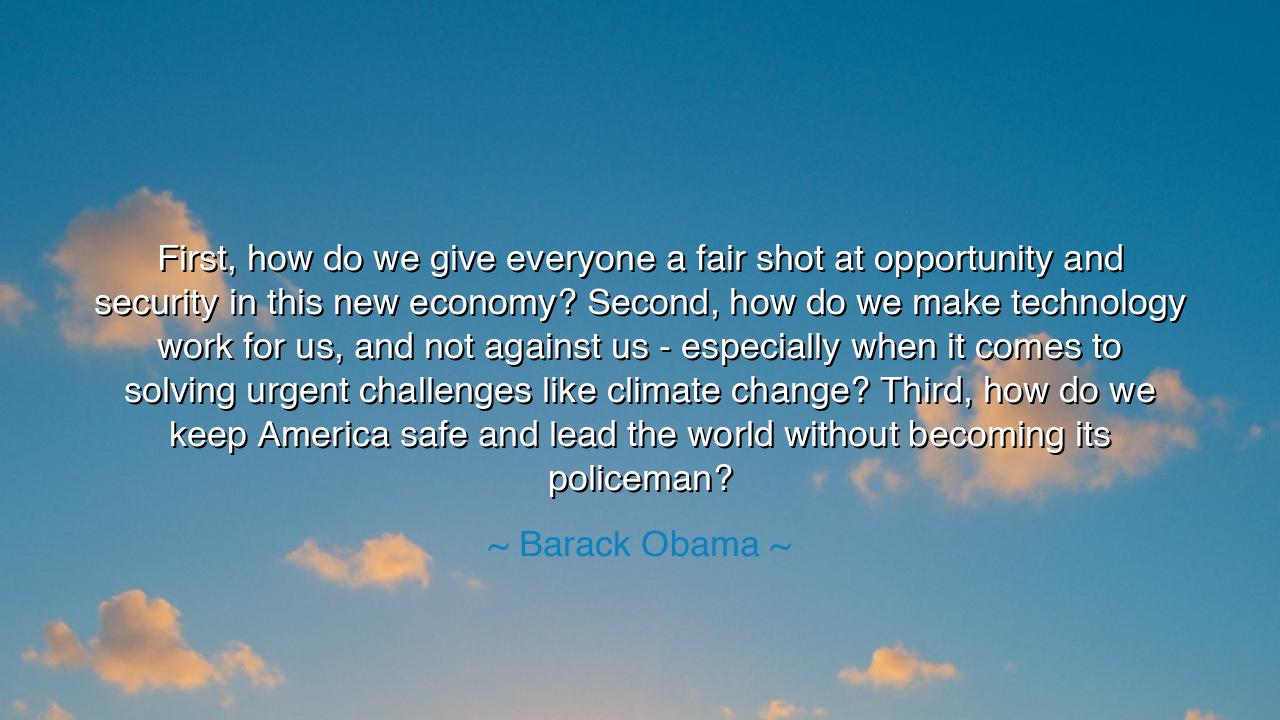
First, how do we give everyone a fair shot at opportunity and
First, how do we give everyone a fair shot at opportunity and security in this new economy? Second, how do we make technology work for us, and not against us - especially when it comes to solving urgent challenges like climate change? Third, how do we keep America safe and lead the world without becoming its policeman?






Barack Obama, a leader who carried both the weight of history and the hope of millions, once spoke these words: “First, how do we give everyone a fair shot at opportunity and security in this new economy? Second, how do we make technology work for us, and not against us—especially when it comes to solving urgent challenges like climate change? Third, how do we keep America safe and lead the world without becoming its policeman?” These questions, though framed for his own time, echo with the timeless rhythm of human struggle. They are not merely policy concerns but moral dilemmas, reflecting the eternal challenge of balancing justice, progress, and power.
The ancients, too, wrestled with such questions. In Athens, Pericles asked how the city might grant its citizens both freedom and security, so that opportunity would not belong only to the few. In Rome, leaders debated how far their legions should extend, how much of the world they should “police” before overreach brought ruin. In every age, men and women have asked: how can we prosper fairly, how can we master our tools without being mastered by them, and how can we lead without descending into tyranny? Obama’s words are but the modern form of these eternal questions.
The first challenge is opportunity and security in the new economy. Every transformation—whether the agricultural revolution, the rise of industry, or today’s digital age—creates winners and losers. The steam engine brought wealth to some but suffering to others; factories gave work, but also stripped dignity. So too now, the digital economy promises abundance, but risks leaving many behind. The wise leader asks, as Obama does: how can all be given a fair chance? For a society divided by inequality cannot long endure, and opportunity hoarded by a few is the seed of unrest.
The second challenge is technology itself. From the fire of Prometheus to the atom split in the twentieth century, mankind has always risked being devoured by its own creations. The wheel bore goods across kingdoms, but it also bore armies to conquest. Nuclear fission lit cities, but it also burned Hiroshima. And now, in the age of digital intelligence and rising machines, the question burns anew: will technology serve humanity, or will humanity serve technology? When Obama speaks of climate change, he names the greatest trial of our era: whether our tools will help heal the earth or hasten its destruction.
The third challenge is safety and leadership. Nations rise and fall not only on their wealth and wisdom, but also on their place in the world. Rome once sought to lead all, yet in time, the burden of policing the world broke its back. In contrast, smaller powers that led by example, through trade and knowledge, often endured longer. Obama’s question reflects this ancient lesson: how to remain safe, how to lead with strength, yet not become the weary giant who must guard every border and police every quarrel. True leadership lies not in domination, but in guidance, in the power of example, in building alliances that endure beyond armies.
History gives us lessons for each of these questions. Franklin Roosevelt, in the Great Depression, sought to give the ordinary worker both opportunity and security in a broken economy, reshaping the nation with bold reforms. The scientists of the Manhattan Project, once they saw the power of the atom, pleaded for restraint and the wise use of technology. And George Washington, in his farewell address, warned against entangling alliances that might make the young republic into the policeman of the world. Each echoes the wisdom Obama voiced: the need for balance, for restraint, for vision.
So, dear listener, take this wisdom as more than politics—it is the eternal call to every generation. Strive to build an economy where opportunity is shared, not hoarded. Demand that technology serve life, not diminish it. And remember that true safety comes not from ruling all, but from leading with justice and humility. These questions may never be fully answered, but to wrestle with them is the duty of every age. For a people who forget to ask such questions will lose not only their future, but also their soul.






AAdministratorAdministrator
Welcome, honored guests. Please leave a comment, we will respond soon